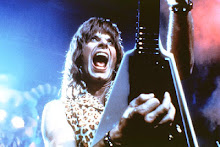V For Victory
Here is what Chris Matthews said on his MSNBC-TV program "Hardball" two days ago: "I agree with what Fareed Zakaria wrote in 'Newsweek' this week, which is terrorism isn‘t explosions and death, terrorism is when you change your society because of those explosions and you become fearful to the point where you shut out immigration, you shut out student exchanges, you shut people out of buildings, you begin to act in an almost fascist manner because you‘re afraid of what might happen to you. That‘s when terrorism becomes real and frighteningly successful. That‘s what I believe, and that‘s why I question the way Giuliani has raised this issue. He raises it as a specter. In a weird way, he helps the bad guys."
Matthews' comments are the reason why the film "V For Vendetta" is a must-see. It is set in a dystopian English future where an authoritarian government, usurping power in a war against terrorists, rules by fear (of terrorism and disease), surveillance of its citizens, and oppression. In such a security state, individual liberty is a thing of the past. Against this backdrop, a masked vigilante with an axe to grind, in the tradition of the original "Batman" but with a twist, tries to blow up London's symbols of power and, in turn, the government behind those symbols.
In its subject matter, "V For Vendetta," written by the Wachowski Brothers (who brought us "The Matrix" films) and based on a graphic novel written in the early 1980s by Alan Moore, follows the tradition of novels and films such as George Orwell's "1984," Ray Bradbury's "Fahrenheit 451," "Soylent Green," "Logan's Run," "The Omega Man," "The Matrix" series and "Brazil." However, most of these dystopian books and movies have a quaintness about them. The stories were interesting, but, at the time, unrealistic. What sets "V For Vendetta" apart from the others is that, due to recent real-life events and government reactions to these events, its story is not so quaint anymore.
Matthews' comments are the reason why the film "V For Vendetta" is a must-see. It is set in a dystopian English future where an authoritarian government, usurping power in a war against terrorists, rules by fear (of terrorism and disease), surveillance of its citizens, and oppression. In such a security state, individual liberty is a thing of the past. Against this backdrop, a masked vigilante with an axe to grind, in the tradition of the original "Batman" but with a twist, tries to blow up London's symbols of power and, in turn, the government behind those symbols.
In its subject matter, "V For Vendetta," written by the Wachowski Brothers (who brought us "The Matrix" films) and based on a graphic novel written in the early 1980s by Alan Moore, follows the tradition of novels and films such as George Orwell's "1984," Ray Bradbury's "Fahrenheit 451," "Soylent Green," "Logan's Run," "The Omega Man," "The Matrix" series and "Brazil." However, most of these dystopian books and movies have a quaintness about them. The stories were interesting, but, at the time, unrealistic. What sets "V For Vendetta" apart from the others is that, due to recent real-life events and government reactions to these events, its story is not so quaint anymore.





0 Comments:
Post a Comment
<< Home